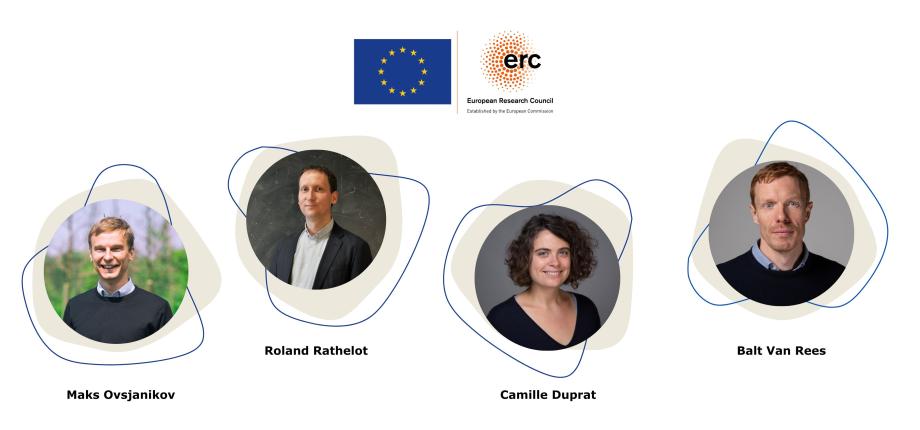Four IP Paris Researchers win the ERC Consolidator Grant

Camille Duprat (Hydrodynamics Laboratory - LadHyX), Roland Rathelot (Center for Research in Economics and Statistics - CREST), and Maks Ovsjanikov (Computer Science Laboratory - LIX ) and Balt Van der Rees (Center for Theoretical Physics - CPHT) lead key projects in different fields of research including Hydrodynamics, Computer Science, Data Analytics as well as Physics.
Roland Rathelot and Maks Ovsjanikov are also research fellows at our interdisciplinary center Hi! PARIS.
Camille Duprat
ElCapiTex – Understanding and modelling wet textiles’ behaviour
The goal of ElCapiTex, led by Camille Duprat at the Hydrodynamics Laboratory (LadHyX*) is to understand how the properties of a paper-like material are affected when wetted, and to leverage on this knowledge to build tailored textiles with a controlled response.
*LadHyX: a joint research unit CNRS, École Polytechnique - Institut Polytechnique de Paris
Maks Ovsjanikov
VEGA – Universal Transfer Learning for 3D data
Designed by Maks Ovsjanikov at Computer Science Laboratory of the École Polytechnique (LIX*), the project VEGA will try to solve problems related to the transfer learning for geometric 3D data.
*LIX: a joint research unit CNRS, École Polytechnique - Institut Polytechnique de Paris
Roland Rathelot
INASHI – Information frictions in hiring decisions
To characterise information frictions and their causes related to unemployment rates and unsatisfied job vacancies, Roland Rathelot, professor at ENSAE Paris, researcher at the Centre for Research in Economics and Statistics (CREST*) and research fellow Hi! PARIS will lead the INASHI project**
*CREST : a joint research unit CNRS, École Polytechnique - Institut Polytechnique de Paris, ENSAE Paris - Institut Polytechnique de Paris, GENES
** GENES is the host institution for the project
Balt Van Rees
QFTinADS – Improving the understanding of quantum field theories
In his project QFTinADS, Balt Van Rees (Center for Theoretical Physics, CPHT*) will push further a strategy called the “bootstrap”, that aims at better understanding QFTs by exploring very general consistency conditions.













